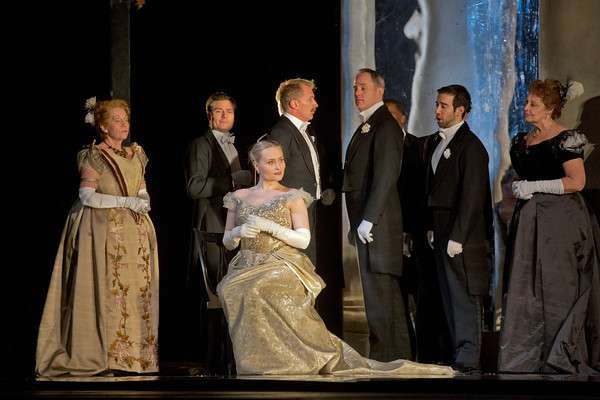|
Back
The Met's new Onegin with a different cast New York
Metropolitan Opera House
11/23/2013 - & November 29, December 2, 5, 12, 2013
Peter Ilyich Tchaikovsky: Eugene Onegin, opus 24
Marina Poplavskaya (Tatiana), Peter Mattei (Eugene Onegin), Rolando Villazón (Lenski), Elena Maximova (Olga), Elena Zaremba (Larina), Larissa Diadkova (Filippyevna), John Graham Hall (Triquet), Richard Bernstein (Zaretski), Stefan Kochin (Prince Gremin)
The Metropolitan Opera Chorus, Donald Palumbo (chorus master), The Metropolitan Opera Orchestra, Alexander Vedernikov (conductor)
Deborah Warner (production), Fiona Shaw (director), Tom Pyle (set designer), Chloé Obolensky (costume designer), Jean Kalman (lighting designer), Ian William Galloway and Finn Ross (video designers), Kim Bradstrup (choreographer)

(Courtesy of the Metropolitan Opera)
Tchaikovsky's adaption of Alexander Pushkin's novel in verse about the regretful life of a conceited young man opened the Met's new season with superstar Anna Netrebko in the leading soprano role and the eminent Valery Gergiev on the podium. After a short hiatus the opera is back with a new cast. Alexander Vedernikov takes over in the pit in his Met debut, with the rising diva Marina Poplavskaya as Tatiana and the long disappeared but potentially superstar tenor Rolando Villazón as Lenski.
The results were mixed. Tatiana is in many ways as central to the opera's (if not the original Pushkin's) plot, and Marina Poplavskaya's lithe soprano tones were an excellent match for the part. She may lack Netrebko's creamy qualities, but dramatically she was in fine form, broadcasting on the broad palette of her distinctive face the many qualities that mark a young Russian woman in love. Peter Mattei was in fine voice as Onegin and excelled with his Russian diction. The surprise star of Wagner's Parsifal (as Amfortas) at the Met last season, his powerful and stentorian instrument gave the part all it needed to succeed.
Less fortunate was the tenor Rolando Villazón, who gave the impression of a washed up star with a voice that was once great but is now rather faded. Lenski's Act II aria "Kuda, kuda vy udalilis'" was genuinely affecting but otherwise his tentative return to the Met stage fell rather flat. Elena Maximova made a fine debut in the smaller role of Tatiana's sister Olga. Stefan Kocan sang a fine Prince Gremin. Vedernikov's conducting was precise but still captured many of the dramatic moments well.
Deborah Warner's production premiered at the English National Opera in 2011. It seemed tighter then. The director was unable to work on the Met adaptation, leaving the details to director Fiona Shaw. The approach is rather traditional and occasionally a bit campy. Act I is set in what looks like a vast barn. The chorus and dance of the Larin family's serfs was jovial but strangely combined with a religious procession, a mixing of customs that would certainly have been taboo. Act III's ball room scene, set in a colonnaded hall with lighting effects in sharp relief, was rather better. Video projections gave a good literal idea of bleak Russian landscapes.
Paul du Quenoy
|